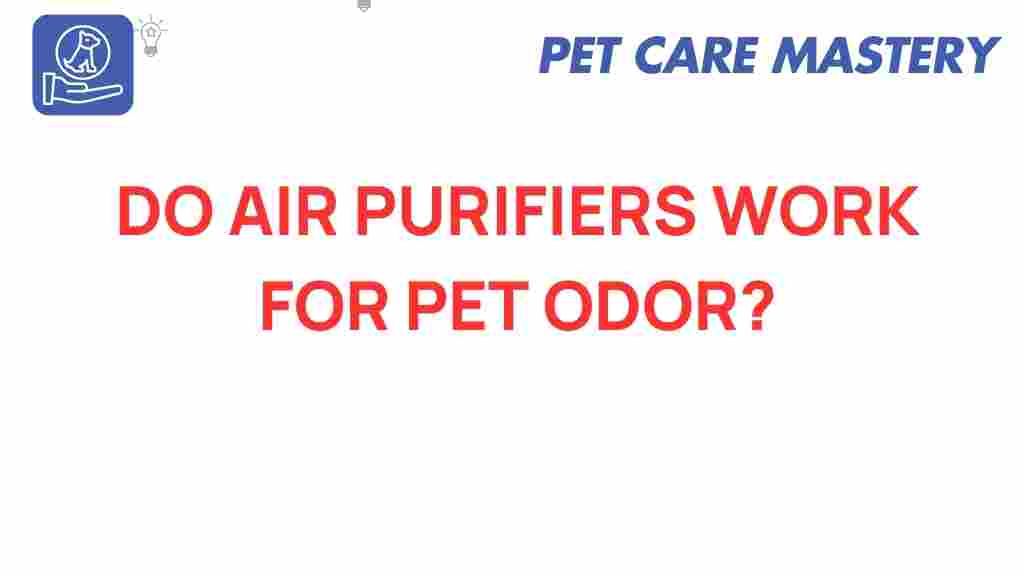Do Air Purifiers Really Eliminate Pet Odors?
As pet ownership continues to rise, so does the need for effective solutions to manage pet-related odors. Many pet owners are turning to air purifiers in hopes of eliminating pesky smells from their homes. But do air purifiers really eliminate pet odors? In this article, we will explore the truth behind air purifiers and their effectiveness in managing pet odors, providing you with a comprehensive understanding of how they work, what features to look for, and tips for maximizing their efficiency.
Understanding Air Purifiers
Air purifiers are devices designed to remove pollutants from the air, improving indoor air quality. They work by using filters and sometimes additional technologies to capture and neutralize various airborne particles and odors. Here are some common pollutants that air purifiers target:
- Dust and dust mites
- Pollen
- Pet dander
- Smoke
- Odors
- Volatile organic compounds (VOCs)
In the context of pets, many owners are particularly concerned about pet dander and odors, which can be persistent and challenging to eliminate with traditional cleaning methods alone.
How Air Purifiers Work
To understand whether air purifiers can effectively eliminate pet odors, it’s essential to know how they function. There are several types of air purifiers, each using different technologies:
HEPA Filters
High-Efficiency Particulate Air (HEPA) filters are the gold standard in air purification. They can capture 99.97% of particles as small as 0.3 microns. This includes pet dander, which can significantly contribute to unpleasant odors in your home. When choosing an air purifier for pet odors, look for one that features a true HEPA filter.
Activated Carbon Filters
Activated carbon filters are excellent for absorbing odors. The porous nature of activated carbon allows it to trap volatile compounds and neutralize smells, making it a great addition to any air purifier designed to combat pet odors.
UV Light Technology
Some air purifiers come equipped with UV light technology. While primarily used to kill bacteria and viruses, UV light can also help reduce certain odors by breaking down organic compounds.
Do Air Purifiers Eliminate Pet Odors?
The short answer is yes, air purifiers can help eliminate pet odors, but their effectiveness depends on several factors:
- Type of Filter: As mentioned earlier, a combination of HEPA and activated carbon filters is ideal for removing pet dander and odors.
- Room Size: Ensure the air purifier is rated for the size of the room you plan to use it in. A purifier that is too small will struggle to clean the air effectively.
- Air Changes per Hour (ACH): Look for a purifier that can achieve multiple air changes per hour to ensure consistent air quality.
- Maintenance: Regularly replace filters as recommended by the manufacturer to maintain optimal performance.
Step-by-Step Process: How to Use an Air Purifier for Pet Odors
To maximize the effectiveness of your air purifier in eliminating pet odors, follow these steps:
1. Choose the Right Air Purifier
Select an air purifier that features a HEPA filter and activated carbon filter. Ensure it is suitable for the size of the space you want to purify.
2. Position the Air Purifier Correctly
Place the air purifier in a central location within the room. Avoid corners or areas blocked by furniture to ensure optimal airflow.
3. Maintain Cleanliness
Regularly clean your home to minimize pet hair and dander. Vacuum floors, wash pet bedding, and groom your pets frequently.
4. Run the Air Purifier Continuously
For the best results, run the air purifier continuously, especially in areas where your pets spend most of their time.
5. Monitor Filter Replacement
Keep track of when to replace filters based on usage. Clogged filters can hinder efficiency and reduce odor elimination.
Troubleshooting Common Issues with Air Purifiers
If you find that your air purifier is not effectively eliminating pet odors, consider the following troubleshooting tips:
- Check Filter Condition: Ensure that the filters are clean and not clogged. Replace them if necessary.
- Verify Room Size: Make sure the air purifier is rated for the size of the room you are using it in.
- Inspect Airflow: Ensure that there are no obstructions around the unit that may impede airflow.
- Evaluate Usage: Consider running the purifier more frequently or on a higher setting if odors persist.
Additional Tips for Managing Pet Odors
While air purifiers can significantly help in managing pet odors, here are some additional strategies:
- Regular Cleaning: Incorporate a routine cleaning schedule to keep pet hair and dander at bay.
- Use Odor Neutralizers: Utilize natural odor neutralizers like baking soda or commercial pet odor sprays in conjunction with your air purifier.
- Ventilation: Open windows when weather permits to allow fresh air to circulate and help reduce odors.
- Grooming: Regularly groom your pets to minimize shedding and dander.
For more information on maintaining a pet-friendly home, check out this comprehensive guide on pet care tips.
Conclusion
In conclusion, air purifiers can play a significant role in eliminating pet odors when equipped with the right filters and used correctly. While they are not a standalone solution, combining their use with regular cleaning and good pet care practices can create a fresher, more pleasant living environment. If you’re a pet owner struggling with odors in your home, investing in a quality air purifier could be a game-changer.
Ready to improve your indoor air quality? Explore our selection of top-rated air purifiers today!
This article is in the category Products and created by PetCareMastery Team
